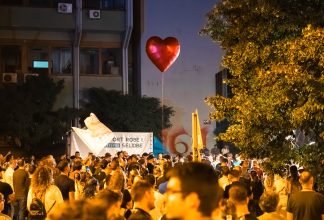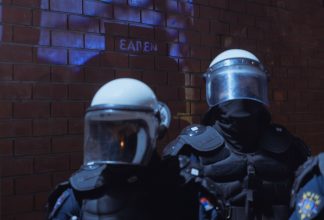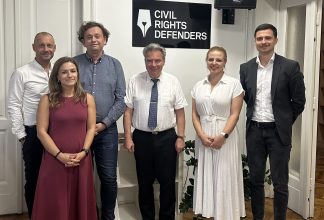”Smokescreen or Reality” – Protecting the LGBT Community in Serbia
In 2016 Boban Stojanovic and his partner Adam Puskar two leading figures of the Belgrade Pride Organisation and LGBT activists were forced into exile to Canada fearing for their lives and safety. After years of combatting hate speech and fighting for the rights of the LGBT community in Serbia and further afield the legislation designed to protect them has in their opinion failed miserably.
In March 2009, anti-discrimination legislation was introduced in Serbia under the guise of the Law on Prohibition of Discrimination (Zakon o zabrani diskriminacije). The overall purpose of the Anti-Discrimination Law was to introduce a systemic law as a basis for integral and general anti-discrimination protection in all areas.
Under this universal legislation enhanced mechanisms have been provided for the “protection against any kind of discrimination (including, without limitation, racial, gender, sexual orientation, genetic, religious, cultural, invalidity, age, membership of political, labour union and other organisations, etc.”
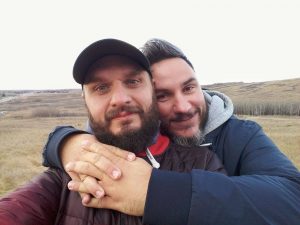
However, many marginalised communities within Serbia such as the LGBT community would argue that this piece of legislation is merely a smokescreen and the reality is very different.
“To be a gay activist in Serbia means being exposed to many different forms of hate speech and violence. Over the years I have unfortunately learned that one of the most important goals of the haters is to spread fear as they attempt to make us fragile,” said Boban Stojanovic
Continuing their struggle for equal rights from Calgary, Canada, Civil Rights Defenders had the opportunity to catch up with Boban and Adam to establish what the reality is like for LGBT people in Serbia and what he and his partner have experienced.
Interview with Boban Stojanovic and Adam Puskar:
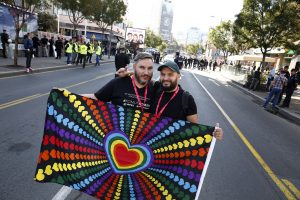
Can you give a brief background of what led up to you both having to leave Serbia for Canada?
Insecurity. And moreover, the lack of respect for our lives, the lives of the LGBT community and our dedicated work when it comes to building a human rights culture in Serbia. This is also coupled with the numerous unresolved cases of hate speech and attacks against us taken in front of the Serbian Courts and the arrogant attitude of Serbian decision makers. For example, the attack on our flat in 2013 is still under investigation while two of the perpetrators who were successfully identified back in August 2016 still walk freely.
How do you feel about having to leave your country because you are in danger for simply being LGBT activists?
This was a very hard decision for us. Not because we want to be pathetic or to present ourselves as victims, but for us as human rights defenders who deeply believe in social change and accept all this negative experiences as a price that we have to pay for our freedom. Our decision came after so many conversations and soul searching which Adam and I had in order to stay strong and survive the anti-human rights climate in Serbia. While human rights activists are under risk, even in more liberal states than Serbia, in our country it is the complete lack of institutional interest to protect human right defenders that is glaring. In order to survive, we had to move.
How prevalent is hate speech and attacks against the LGBT community in Serbia? Can you give a specific example, either from your experience or what you have seen?
Every time I published a story about some hate attacks against us on Facebook, my inbox became full citing similar experiences from other LGBT people. But, most of us are still forced to live in shame and fear of social exclusion and in the majority of cases exposed to violence and discrimination against the LGBT community. These incidents are still largely unreported or unregistered. We are invisible in mainstream Serbian society.
What is the future for LGBT people in Serbia in your opinion? Do you hold out any hope?
As with everything, some things may change with the passing of time. Once the issue becomes open then in some ways it becomes unstoppable. While I am not overtly afraid about the format of this change, there will be some change that I am sure of, but what I do worry about is the content, dedication from law makers and the authorities and above all its continued sustainability/momentum. Trivialisation of society has also led to a deep reflection on the LGBT movement and community, so I can’t recognise any foundations for a wider promotion of LGBT rights in Serbia certainly over the next ten years.
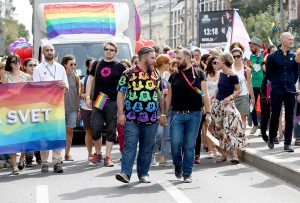
Do you have a message to those people, groups who have forced you into this situation?
As activists, we feel it is our duty to speak out about the homophobic violence we have faced. But, after every attack I felt portrayed as a liar: my story was there for everyone to see, but in front of the Serbian justice system there were no perpetrator(s), my fears went totally unrecognised and trivialised and of course all the cases provided no answers and no punitive sanctions were awarded by the courts against the attackers further stripping away the notion of safety and justice. When I read comments on the internet or listened to what people around me had to say, there was always a tone of accusation: I do what I do because I need the money and media attention. Instead of making strong cooperation between human rights defenders and state institutions, Serbian leaders have decided to be neutral and have permitted homophobic hooligans and haters to become stronger then the law.
Serbia is a candidate country for the EU yet many LGBT people live in fear? What in your opinion does the government need to do before LGBT people can begin to feel comfortable living in Serbian society?
For more than two decades Serbian society has lived in a culture of lies. And this is the principal thing which completely demolishes a culture that supports mechanisms so citizens can live without fear. It is this breakdown in culture that leads to the misery we see today in Serbia. If they want to change something, Serbian decision makers must focus on diversifying the current culture into one of human rights. Human rights are an idea(l) and like every idea, people have to give meaning to that idea. If we just look at the public topics in Serbia today, if we simply analyse the behaviour of our Prime Minister and other leading figures; what stands out is the high level of arrogance coupled with the low level of sympathy, with no appetite for sustainable change in what I see as this ruined country. The first major step is to create an environment where people’s dignity can be empowered. To achieve this you must change the culture.
